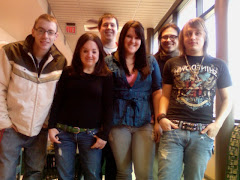
At one time in your life you have undoubtedly been in a group that was anything but effective. If you've never experienced an ineffective group consider yourself one of the lucky ones. Ineffective groups can be incredibly frustrating, but with the use of some helpful tips, you may never have to experience a bad group experience again!
In the article writen by Violeta Navickiené and Sigita Pevcevičiūtė they provide different things you can do to become an effective group member or group as a whole. In this blog we will be focusing on the parts of the article that we feel would be most helpful to anyone in a small group setting. We have broken this blog down into five of the most imporant things you need to know regarding group effectiveness.
• It is most conducive to you and your group to have a clear understanding of the group charge(ultimate goal of the group), which you can break down into smaller goals to make it easier to accomplish. If any member of the group is having trouble understanding anything in the group it is important to have clear communication between members.Openess in the group allows members to share their imput or concerns without fear of personal ridicule.
• It is importnat not only to have good communication skills but to also have an understanding of what makes a team effective. This includes: quality leadership, cohesion, effective conflict resolution, efficient meetings, etc. Make sure all members of your group understand what it means to be an effective group.
• If given the option of choosing your own group members it is important to realise what roles will be needed and choose people that have the best skills to get the job done. In the case where you did not get to choose your own members determin what skills your group members have and assign jobs accordingly.
• The first stage of the group, the "forming" stage, can be a rather uncomfortable time for the group. During this stage, it is normal to experience some form of conflict, which can be viewed as positive or negative. The memebers of the group who are faced with the conflict must handle the situation in an appropriate manner so that the group may grow and move forward. The best course of action would be to collaborate so that both parties involved reach a happy medium.

• Cohesion is typically a great attribute in any group, but there are times when you may be faced with "too much of a good thing." Too much cohesion can rapidly turn into something known as "groupthink," which is very dangerous for the progress of a group. Groupthink occurs when all members seem to agree on a subject without hesitation. It is essential for members to occasionally disagree so that new ideas may be brought forth.
The parts of this article that we have discussed reflect on what we have studied in our Small Group Communication class.
Have you ever been in a group situation where one or more of the tips listed above have been missing or done ineffectively? How did your group handle it?
Sources:
Navickiené Violeta and Pevcevičiūtė, Sigita. (2009). Tiltai / Bridges; 2009, Vol. 45 Issue 1, p83-91, 9p. Retrieved from http://web.ebscohost.com/ehost/pdf?vid=4&hid=12&sid=b37fca59-bf8a-492d-898c-5417448fb233%40sessionmgr12
 In a study completed by Robert Moore, an experiment was conducted to find the results of cohesion on levels of group creativity. Although the study is a bit out-dated, the results were still very relevant to current small group communication. The study showed that groups who have higher cohesion levels gave more creative answers when asked to critique music and artwork. A potential reason for this is that high cohesion reduces the risk of negativity among group members thus making it a more inviting environment to share ideas. The final findings showed that group work does not necessarily lead to increased group creativity. According to the study the group must be cohesive in-order for it to work effectively. Cohesion can be great but if it goes to far it can lead to groupthink which will in turn eliminate creativity.
In a study completed by Robert Moore, an experiment was conducted to find the results of cohesion on levels of group creativity. Although the study is a bit out-dated, the results were still very relevant to current small group communication. The study showed that groups who have higher cohesion levels gave more creative answers when asked to critique music and artwork. A potential reason for this is that high cohesion reduces the risk of negativity among group members thus making it a more inviting environment to share ideas. The final findings showed that group work does not necessarily lead to increased group creativity. According to the study the group must be cohesive in-order for it to work effectively. Cohesion can be great but if it goes to far it can lead to groupthink which will in turn eliminate creativity.








